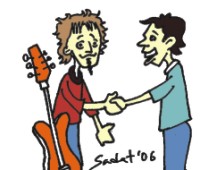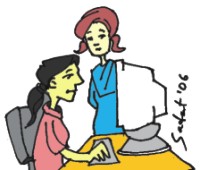| Learner's Club
Congratulations And Well Done!
If we look around us and observe how people carry on their everyday conversations we will notice that often conversational speech follows some formulas and routine expressions. In English also for holding everyday conversations we need to use certain expressions quite frequently. Today we will see some of the different ways in which we can respond to a good or a bad news.
A. Matin studies in a college in Dhaka. His parents live in a small town under Faridpur district. Matin is talking to his father over telephone.
Matin : Hello, Dad?
Father : Matin? How are you?
Matin : Fine, Dad. I just got my exam. results. I've got an A in my English paper.
Father : Well done, son! I'm so proud of you!
Matin : Thanks, Dad. I've got to go now. I'll call you again next week.
Father : Bye, son. Take care.
Matin : You too, Dad. Bye |
|
 |
B. Salim is a pop singer and is quite popular with the young generation. His new album has just come out.
Alok : Hello, Salim. You look very happy today!
Salim : I am happy. I just heard that my new album has been a number one hit!
Alok : Oh, great! Congratulations! We must celebrate!
Salim : Thanks, Alok. We surely will. I can't tell you how happy I am! |
C. Nasreen, Laily and Shihab are acquaintances. Laily has been out of town for some times.
Laily : Hi. Nasreen. I hear that you and Shihab are getting married.
Nasreen : That's right. The wedding is on the 15th of next month.
Laily : Congratulations! I wish you all the happiness, Nasreen.
Laily : Thanks, Laily. Hope you would come. You'll get the invitation card soon. |
|
 |
D. Rehana : Hello, Rumi. Do you know I've got that job I applied for?
Rumi : Good for you! You'll have more time to yourself now.
Rehana : That's right. I won't have to travel any more. I'll be looking after the accounts in the head-office.
|
E. Manzoor : Hello, Raj. What's the matter? You really look excited!
Raj : Guess what! I've won Tk. 50,000 in a lottery!
Manzoor : Oh, that's marvellous! What are you going to do with it? |
|
Note: When we become glad or happy to hear about a good news, we usually express our happiness with some more or less fixed expressions such as, Well done!, Congratulations!, I must congratulate you!, Good for you!, That's marvelous!, That's wonderful! Great! etc.
Let's now see what we should say when we hear about something not good or happy.
 |
F. Kalm : Hello, Malik. Where have you been all this time?
Malik : Well, I had flu for the last two weeks. As a matter of fact, I had to be hospitalised.
Kaim : Oh, I'm sorry to hear that. How do you feel now?
Malik : I'm all right. now, thanks. |
G. Jamil : Hi, Shuman! Have you seen the results?
Shuman : Yes. I failed my chemistry test.
Jamil : Oh, I'm sorry to hear that, Shuman. That's bad luck! |
|
 |
H. Karim : I hear you're going to Nepal on a holiday!
David : No, I won't be able to go anywhere at all.
Karim : Why? What's the matter?
David : The Chief of the company from Geneva have suddenly decided to come during that time.
Karim : Oh, what a shame! You must have made all the plans.
David : I did!
Karim : Never mind! You can't help these things. |
I. Shakil : Hello, Neil. Why are you so quiet today?
Neil : I've failed my driving test again.
Shakil : That's really hard luck! Come, let's go and have tea somewhere.
I'm sure you can do it next time. |
|
Note: Learning some routine expressions by themselves cannot really help unless you learn when to say what. If your response is not appropriate, instead of creating harmony and good will, it can actually create a rift or embarrassment between the speaker and the listener. For example, Shamim has given Bani a ride home. On reaching home, Bani says,
Bani : Thanks for the ride. (or lift)
Shamim : Thank you, thank you.
Bani gets embarrassed as she couldn't be sure what Shamim actually meant. The expected answers to 'Thank you' here could be, 'You're welcome', or 'My pleasure', or 'You needn't mention'.
Again, Shamim has taken Bani for lunch at his office canteen. After lunch,
Bani : Thanks for the meal. The food was really good.
Shamim : It doesn't matter.
Shamim's answer is rude. It shows annoyance which we can safely presume was not intended.
Or, suppose you have to cancel a touring program with you friends because one of your friend's father has suddenly died. Read the following dialogue,
You : Hasan's father died yesterday. We have to cancel the program.
A friend : What a shame!
Although we say 'What a shame!' or 'What a pity!' when we're disappointed to hear something, using these in a situation like the above is not only most inappropriate, it is also outrageous!
Answers to the Riddles.
What kind of scale is not found on a fish? A weighing scale.
When is a person who is “bound” not tied up? When he is going somewhere.
When is lumber of no use to a carpenter? When it means to move in a slow awkward way.
When is it hard to walk with a cane? When it is part of a sugarcane.
Copyright
(R) thedailystar.net 2006 |
|
